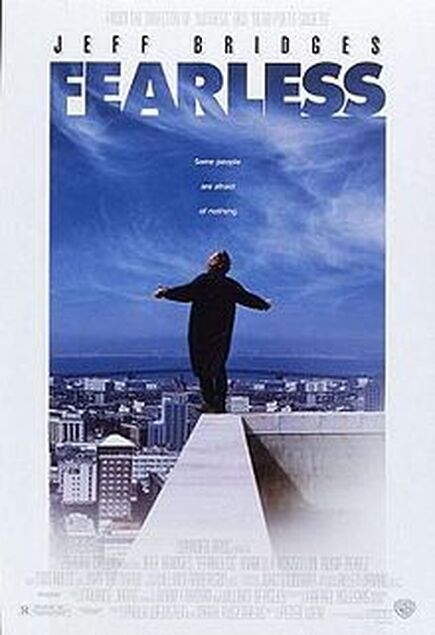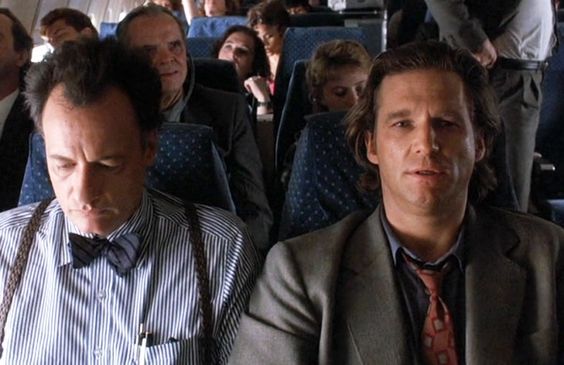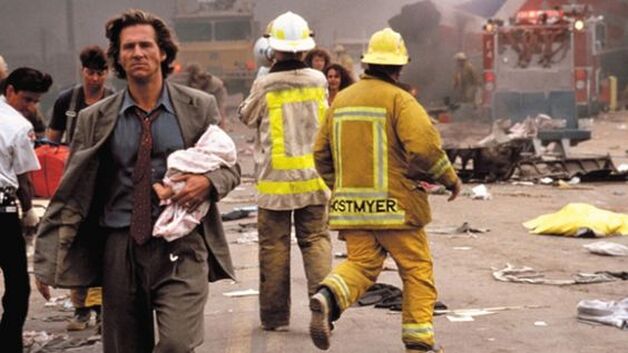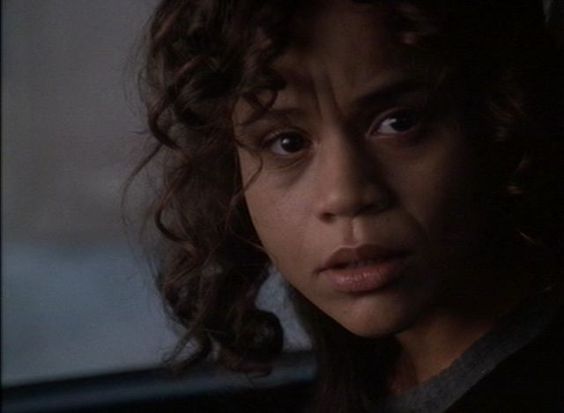Fearless (1993)
|
Directed by: Peter Weir
Starring: Jeff Bridges, Rosie Perez, Isabella Rossellini IMDB Rating: 7 Written for Perisphere Blog: https://www.perisphere.org/2023/09/01/turbulent-epiphanies-in-peter-weirs-fearless/ There were many flights that were so turbulent I calculated which would be better, to crash in Lake Michigan, hoping for a ‘miracle on the Hudson’ outcome, or a rougher landing in some field. It was silly, but it passed the time as the plane rocked from side to side or dropped in altitude. Afterwards, I would remind myself of the odds against plane crashes and get on the next flight. Peter Weir’s Fearless, however, planted the seed that perhaps activating a calming mechanism in the brain would perhaps not change the outcome, but might lead to some kind of epiphany; a freedom before death.
Screenwriter Raphael Yglesias based his novel of the same name on the crash of United Flight 232 that crashed in Sioux City, Iowa on July 19, 1989, killing 112 of the 296 people on board. While the crash was the deadliest plane crash in U.S. history at the time, it was also hailed as an example of exemplary crew management in saving 112 lives. The crash was dubbed the ‘impossible landing’ due to the crew losing complete control of the airplane’s hydraulic systems necessary to control every instrument on the plane. Instead of focusing on the heroics of the crew, however, Yglesias told the fictionalized story of several of the survivors and the impact of grief, guilt, and shame that they experienced in the aftermath. God, love, exploitation and faith, in their unique extremes, are also explored in this wholly unique and emotional film. |
Fearless has been described as having hallucinogenic qualities through its continually shifting of perspective and place, flashing back to the crash at different moments and opening in a hazy and otherworldly landscape before pulling back to reveal the larger carnage of the crash scene. Jeff Bridges, playing survivor Max Klein and dubbed the good Samaritan for having led a group to safety in the aftermath, moves through his trauma in fits and starts, which adds to ephemeral nature of reality. His surprise at the realization of survival is quickly replaced by euphoria, then nostalgia and disassociation. At one point he even comforts another survivor, telling her they are ghosts, as they move through a crowded mall unnoticed. He floats from interaction to interaction, never engaging deeply and never sharing the depth of his emotional reaction to his survival. In what is considered one of Bridges best performances, his Max Klein shares the detached personae of other Bridges characters, but here there is clearly a deep emotional current. In a 1993 Movieline Magazine interview, director Weir notes that he was ‘photographing souls’ as he captured the surviving characters and Bridges performance directly reflects that idea. The viewer sees his body, hears his voice and watches his movements, but experiences something entirely different, something untouchable.
If Max Klein floats above life, then Rosie Perez’s grieving mother Carla Rodrigo wallows in it. While she survived, her baby died, having been ripped from her arms on impact. She is practically catatonic when a psychologist introduces her to Klein, setting off the emotional core of the film. As the two struggle to understand their emotions a deep bond binds them together. Emotionally, Carla swings wildly between self-hatred, overwhelming grief and despair in the loss of certainty of her faith. Together, they float alone together, freed from the ignorance of those who love them and surround them. They become a world unto themselves, able to laugh, to live and to feel something, if only for fleeting moments. Perez is magical in her performance, complete and demanding attention whenever she’s on screen. The intimate scene her and Bridges share in a car that ends with a tentative kiss begins their reawakening, allowing the viewer to see that possibility before the characters. It’s a masterclass in simplicity in performance.
If Max Klein floats above life, then Rosie Perez’s grieving mother Carla Rodrigo wallows in it. While she survived, her baby died, having been ripped from her arms on impact. She is practically catatonic when a psychologist introduces her to Klein, setting off the emotional core of the film. As the two struggle to understand their emotions a deep bond binds them together. Emotionally, Carla swings wildly between self-hatred, overwhelming grief and despair in the loss of certainty of her faith. Together, they float alone together, freed from the ignorance of those who love them and surround them. They become a world unto themselves, able to laugh, to live and to feel something, if only for fleeting moments. Perez is magical in her performance, complete and demanding attention whenever she’s on screen. The intimate scene her and Bridges share in a car that ends with a tentative kiss begins their reawakening, allowing the viewer to see that possibility before the characters. It’s a masterclass in simplicity in performance.
For both characters there is an epiphany that brings them back to ‘life’. For Carla it is the realization that she cannot be to blame for her child’s death. A realization that is literally smashed into her, but ultimately frees her to live as she knows she must, by starting over. She breaks with Klein and to allow him to begin to do the same. Klein is different, however, as he continues to tempt fate, to tempt God, to take him for good. He is alive, but not living. He is a soul free of commitment and unable to associate with the body he’s trapped in. It takes a simple act, the bite of a strawberry that constricts his throat, for him to see death before finally uttering “I’m alive” to his thankful wife.
Weir and Yglesias deftly define the gap between living and being alive. For Max and Carla, surrounded by reporters, lawyers, psychologists and even love ones, there is no living without the sense of life. They have experienced death, but live on, destined to be tortured souls without purpose. Only after recalibrating life can they live, with Carla casting off the past and Max reclaiming it. They are given their freedom from death, an opportunity to live fearlessly in the knowledge that thy are indeed, alive.
Source:
“Love, Fear and Peter Weir.” Virginia Campbell. Movieline Magazine, September 1993.
Weir and Yglesias deftly define the gap between living and being alive. For Max and Carla, surrounded by reporters, lawyers, psychologists and even love ones, there is no living without the sense of life. They have experienced death, but live on, destined to be tortured souls without purpose. Only after recalibrating life can they live, with Carla casting off the past and Max reclaiming it. They are given their freedom from death, an opportunity to live fearlessly in the knowledge that thy are indeed, alive.
Source:
“Love, Fear and Peter Weir.” Virginia Campbell. Movieline Magazine, September 1993.





